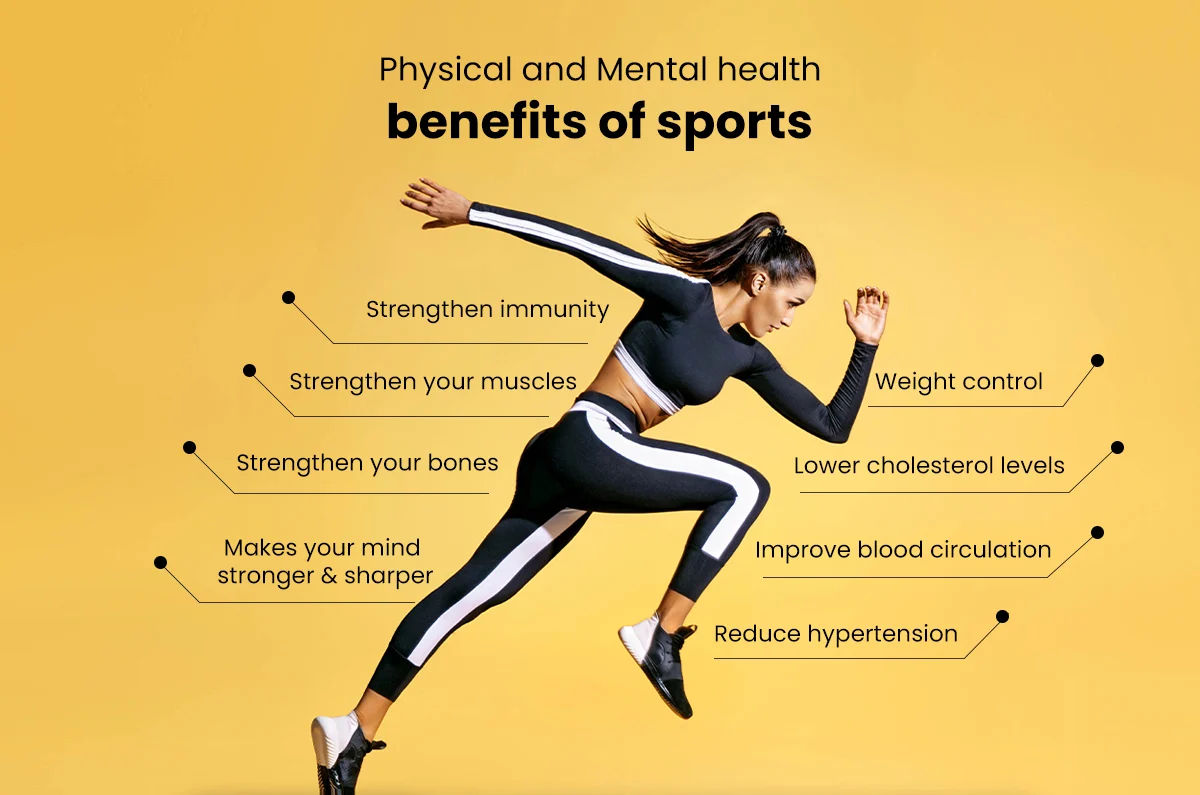Sports have been an integral part of human civilization for centuries, serving not only as a source of entertainment but also as a powerful catalyst for promoting physical and mental well-being. The benefits of engaging in sports extend far beyond the confines of a playing field; they permeate into various aspects of an individual’s life, positively influencing their physical health, mental acuity, and overall quality of life. This comprehensive analysis delves into the multifaceted advantages of sports, exploring the physiological, psychological, and social dimensions that contribute to the undeniable assertion that sports are indeed good for health.
Physical Health Benefits:
- Cardiovascular Fitness: Regular participation in sports promotes cardiovascular health by enhancing the efficiency of the heart and circulatory system. Activities such as running, swimming, and cycling improve blood circulation, reduce the risk of heart disease, and contribute to overall cardiovascular fitness.
- Muscle Strength and Endurance: Sports involve a wide range of movements that target different muscle groups. Whether it’s lifting weights, playing tennis, or engaging in team sports, these activities contribute to the development of muscle strength and endurance, fostering a robust musculoskeletal system.
- Weight Management: The prevalence of sedentary lifestyles and obesity-related issues is a global concern. Sports provide an effective avenue for weight management, as they burn calories, increase metabolism, and promote the development of lean muscle mass.
- Bone Health: Weight-bearing sports, such as soccer and basketball, stimulate bone density and strength. The impact and resistance experienced during these activities are conducive to maintaining healthy bones, reducing the risk of osteoporosis and fractures.
- Flexibility and Coordination: Many sports require a combination of flexibility and coordination. Yoga, gymnastics, and martial arts, for example, contribute to improved flexibility and refined motor skills, enhancing overall physical agility.
Psychological Benefits:
- Stress Reduction: Engaging in sports triggers the release of endorphins, the body’s natural mood enhancers. Physical activity serves as an effective stress reliever, helping individuals manage and alleviate the pressures of daily life.
- Improved Mental Health: Regular participation in sports has been linked to a reduced risk of mental health disorders such as depression and anxiety. The combination of physical exertion, social interaction, and the sense of accomplishment derived from sports can positively impact mental well-being.
- Enhanced Cognitive Function: Sports demand quick thinking, strategic planning, and split-second decision-making. These cognitive demands stimulate the brain, promoting the development of cognitive functions such as problem-solving, memory, and concentration.
- Boosted Self-Esteem and Confidence: Success and improvement in sports contribute to a heightened sense of self-esteem and confidence. Whether it’s mastering a new skill or achieving a personal best, these accomplishments translate into a positive self-image that extends beyond the sports arena.
- Discipline and Goal Setting: Sports instill discipline and the ability to set and pursue goals. Athletes learn the value of hard work, dedication, and perseverance, attributes that are transferable to various aspects of life.
Social Benefits:
- Team Building and Camaraderie: Team sports foster a sense of belonging and camaraderie. Working towards a common goal, athletes develop teamwork, communication skills, and mutual respect, creating lasting bonds with teammates.
- Social Integration: Sports provide a platform for social interaction and integration. Whether through joining a local sports club or participating in community events, individuals can connect with others who share similar interests, promoting a sense of community.
- Cultural Exchange: International sports events bring people from diverse backgrounds together, fostering cultural exchange and understanding. The shared passion for sports transcends linguistic and cultural barriers, promoting global unity.
- Leadership Development: Many sports require individuals to take on leadership roles, whether as team captains or coaches. This experience nurtures leadership skills, teaching individuals how to motivate and guide others towards a common objective.
Lifelong Habits and Longevity:
- Establishing Healthy Habits: Engaging in sports from a young age establishes a foundation for a healthy lifestyle. The habits formed during childhood and adolescence, such as regular physical activity and a balanced diet, often persist into adulthood, reducing the risk of lifestyle-related diseases.
- Increased Longevity: Numerous studies suggest a positive correlation between regular physical activity, such as sports participation, and increased life expectancy. The cumulative health benefits of sports contribute to overall well-being, reducing the risk of chronic diseases associated with aging.
Challenges and Considerations:
- Injury Risks: While sports offer numerous benefits, the risk of injuries cannot be ignored. Proper training, warm-up routines, and adherence to safety guidelines are essential to mitigate the risk of sports-related injuries.
- Access and Inclusivity: Disparities in access to sports opportunities exist across different socio-economic groups. Efforts must be made to ensure inclusivity, providing opportunities for individuals of all backgrounds and abilities to participate in sports.
- Pressure and Burnout: In competitive sports environments, the pressure to excel can lead to burnout, particularly among young athletes. Striking a balance between competition and enjoyment is crucial to prevent the negative consequences of excessive pressure.
Conclusion:
In conclusion, the evidence supporting the assertion that sports are good for health is compelling and multidimensional. From the physiological advantages of improved cardiovascular fitness and muscle strength to the psychological benefits of stress reduction and enhanced cognitive function, and finally, the social advantages of teamwork and community integration, sports contribute significantly to holistic well-being. Moreover, the establishment of healthy habits, leadership development, and the potential for increased longevity further underscore the importance of incorporating sports into one’s lifestyle.
While challenges such as injury risks, accessibility, and the potential for burnout exist, addressing these issues through proper education, inclusive policies, and a balanced approach to competition can ensure that the benefits of sports are accessible to a broader spectrum of the population. As we navigate an era where sedentary lifestyles and associated health issues are on the rise, the promotion of sports as a tool for holistic health becomes increasingly imperative. In essence, the pursuit of physical activity through sports is not merely a leisurely endeavor but a profound investment in one’s long-term health and well-being.

